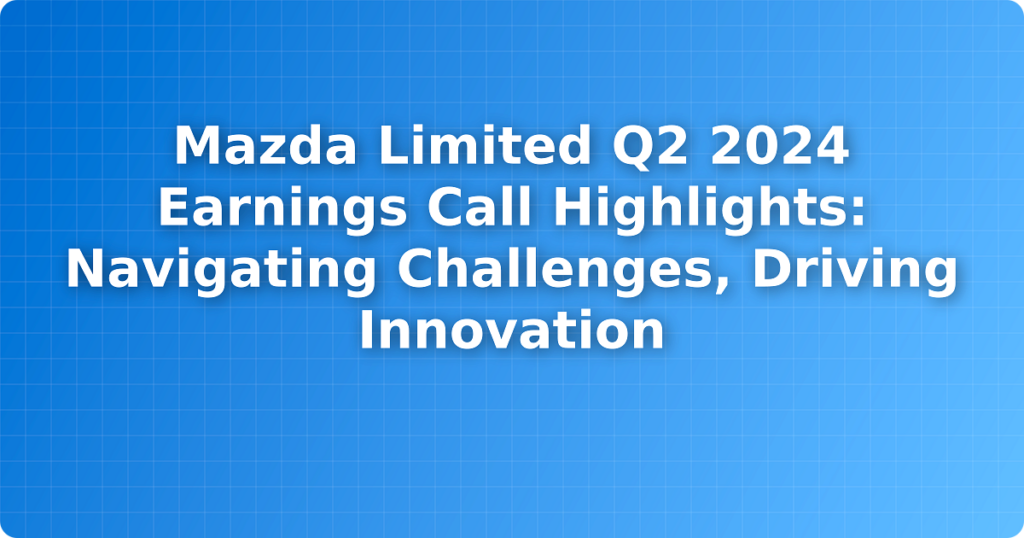Mazda Limited's Q2 2024 earnings call revealed a mixed performance, with challenges in order fulfillment and exports impacting sales figures. Despite this, the company remains optimistic about meeting its revenue targets for FY24-25, driven by a healthy order book, expansion into new markets, and a robust pipeline of innovative products.
Financial Performance:
Mazda Limited experienced a slowdown in sales during the first two quarters of FY24-25, primarily due to clients delaying order pickups and macroeconomic headwinds affecting exports. However, the company expects to match, if not exceed, the previous year's performance, citing a strong order book totaling ₹115-116 crore. Notably, the aftermarket revenue saw a significant increase, driven by strong demand for spares and parts.
"Despite having a healthy order book and consistently receiving a good number of inquiries, several factors have contributed to our less-than-ideal performance in the first two quarters," stated Percy Avari, Whole Time Director.
Operational Updates:
The company's production capacity utilization remains strong, with a single shift capable of generating ₹60 crore in revenue. Mazda is evaluating the need for expansion, potentially utilizing existing land and facilities to increase production. The company also faced temporary downtime due to boiler maintenance, impacting sales performance.
Management Insights:
Management highlighted the increasing competition in the Indian market, particularly from international players attracted by India's economic growth. They emphasized the importance of maintaining high quality and timely deliveries to retain customers and navigate this competitive landscape.
"While the market size is expanding, the rate at which competition is increasing is much higher. This is a concern for us," explained Percy Avari.
Strategic Initiatives:
Mazda is actively pursuing a diversification strategy, focusing on new product development and market expansion. The company is venturing into new areas like Smart Rod Systems, Ion Exchange Membranes, Advanced Evaporation Systems, and Chemical-Free CIP solutions. These products, though currently generating limited revenue, are expected to be significant growth drivers in the coming years.
"While these products might be small or their revenues relatively insignificant at the moment, they are expected to contribute significantly to our company's growth in the coming years, perhaps in the next five years," shared Percy Avari.
Industry and Market Context:
The Indian vacuum systems market is estimated at ₹200 crore, with Mazda holding a significant share of ₹65-75 crore. The evaporators market is considerably larger at ₹400-500 crore, where Mazda holds a market share of ₹60-75 crore. Management believes there is significant potential to increase market share in both sectors.
Future Outlook:
Management remains optimistic about the future, driven by a healthy order book, new product launches, and expansion into new markets. They are actively seeking agents in countries like Malaysia and the UAE to boost exports of non-vacuum system products. The company aims for a moderate growth rate of 10-15% in the coming years, with the potential for exponential growth once new products gain wider market acceptance.
Q&A Session Highlights:
The Q&A session addressed several key points:
- R&D and New Product Development: Mazda is investing in R&D and hiring specialized personnel to support its new product initiatives. The Smart Rod System, a non-chemical anti-scaling solution, is showing promising results and has secured orders from major clients like Hindustan Coca-Cola.
- Export Challenges: Macroeconomic factors, such as currency fluctuations and political instability in certain export markets, have impacted sales.
- Anti-scaling Product Advantages: The Smart Rod System offers significant cost benefits compared to traditional chemical-based solutions, including reduced effluent generation, chemical cost savings, and reduced downtime.
- Market Potential for New Products: While the potential market for new products is substantial, the challenge lies in overcoming the existing market preference for traditional chemical-based solutions and demonstrating the long-term benefits of Mazda's innovative offerings.
Conclusion:
Mazda Limited faces challenges in the short term due to external factors and increased competition. However, the company's strategic focus on innovation, new product development, and market expansion positions it well for future growth. The success of its new product initiatives, particularly the Smart Rod System, could be a key catalyst for achieving its ambitious revenue targets and solidifying its position as a leading provider of engineering solutions.
Read the full concall transcript
Disclaimer: This article summarizes an earnings call and reflects the views expressed by company management. The content is for informational purposes only and does not constitute financial advice. Readers should conduct their own research and consult certified experts before making investment decisions. Acme Inc is not responsible for any actions taken based on the information presented in this article.
